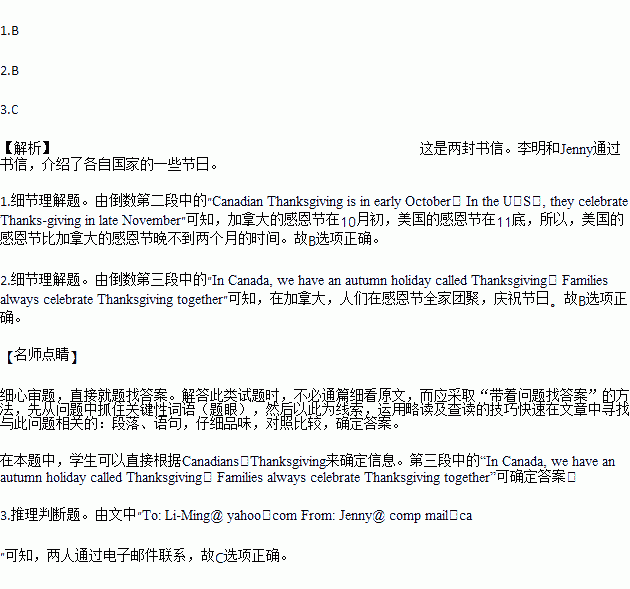题目内容
To: Jenny@ comp mail.ca From: Li-Ming@ yahoo, com
Subject: Autumn! Date: 29 /09 8: 02 PM
Hello, Jenny!
I love autumn! Mid-autumn Festival is this week. We will watch the moon tonight, and look for Chang’e and Wu Gang. My mother bought moon cakes, and I have eaten many of them!
National Day is also in the autumn, on October 1. My mother and father will not have to work for three days! We will do many things together, I like going to the National Day celebration(庆祝).
The best thing in autumn is my birthday; I will be fifteen years old.
Good-bye!
Li Ming
To: Li-Ming@ yahoo.com From: Jenny@ comp mail.ca
Subject: Thanksgiving Date: 29/09 9:12 PM
Dear Li Ming,
Thank you for your e-mail! I love autumn, too. In Canada, we have an autumn holiday called Thanksgiving. Families always celebrate Thanksgiving together. I will go to my grandmother and grandfather’s house. My uncles, aunts and their children will be there, too.
Canadian Thanksgiving is in early October. In the U.S., they celebrate Thanks-giving in late November.
Have a good time on your birthday, Li Ming! On my birthday, I have a cake with candles. Everyone sings ‘Happy Birthday’. Then I blow out the candles! Will you have cake on your birthday? Your friend ,
Jenny
1.Americans celebrate Thanksgiving __ later than Canadians.
A. one month B. less than two months C. two months D. more than two months
2.What do Canadians usually do in Thanksgiving?
A. Eat cakes. B. Stay together. C. Watch the moon. D. Sing the song.
3.What must Li Ming and Jenny use when they wrote to each other?
A. Pens. B. Paper. C. Computers. D. Telephones.

